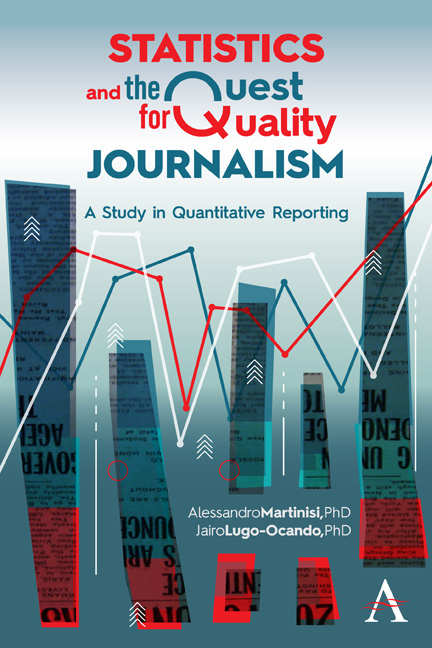Book contents
- Frontmatter
- Dedication
- Contents
- List of Illustrations
- 1 Introduction
- 2 Numbers as Information in the Information Society
- 3 The Never-Ending Debate on Quality in Journalism
- 4 Statistics in Journalism Practice and Principle
- 5 The Normative Importance of ‘Quality’ in Journalism
- 6 Journalism Meets Statistics in Real Life
- 7 The Ideology of Statistics in the News
- Epilogue
- References
- Index
4 - Statistics in Journalism Practice and Principle
Published online by Cambridge University Press: 07 November 2020
- Frontmatter
- Dedication
- Contents
- List of Illustrations
- 1 Introduction
- 2 Numbers as Information in the Information Society
- 3 The Never-Ending Debate on Quality in Journalism
- 4 Statistics in Journalism Practice and Principle
- 5 The Normative Importance of ‘Quality’ in Journalism
- 6 Journalism Meets Statistics in Real Life
- 7 The Ideology of Statistics in the News
- Epilogue
- References
- Index
Summary
There seems to be uniqueness to the logic of journalists’ way of thinking. That is, news reporters have their own way of interpreting the world outside and developing a close system upon which social reality is constructed in the public sphere. The power of journalism as a political institution to define the terms of reference for discursive regimes and narratives that frame people, places and events has been analysed and dissected by sociologists, media scholars and political scientists. However, insufficient engagement has happened with logic and cognitive psychology, which we believe is essential in the analysis regarding the use of statistics in the context of journalism.
To be sure, early calls by Holly Stocking and Paget Gross (1989) highlighted the failure of journalism studies to employ research by cognitive psychologists with regard to the kinds of errors and biases that can negatively alter the processing of information. According to Stocking and Gross, there is a lack of academic research that looks explicitly at the way journalists mentally process information when reporting and gathering the news because there are a number of specific errors and biases that ‘have been found in a variety of professions across a variety of tasks’ as well (Josephi, 2009).
Interestingly, if errors and biases are examined from the perspective of cognitive psychology, several of the errors and biases are also studied in the branch of philosophy known as Logic. Philosophy of Information also belongs to this branch. As Elliot Cohen writes:
Since the latter discipline is directly concerned with providing standards for assessing the adequacy of reasoning, it may prove helpful to keep in mind certain of its fundamental concepts [sic]. Reasoning itself can be understood as a process of making inference. That is, when people reason, they come to conclusions on the basis of evidence. (1985, p. 7)
In information processing, factors like prejudices, prior expectations, values, poor insight, visual conditions and emotional stress affect the ‘quality’ of this inferential reasoning. Stocking and Gross are clear in warning journalists about committing ‘the eyewitness fallacy’, that is, the fallacy of overestimating the reliability of eyewitness reports as compared with other sources of information.
Information
- Type
- Chapter
- Information
- Statistics and the Quest for Quality JournalismA Study in Quantitative Reporting, pp. 53 - 66Publisher: Anthem PressPrint publication year: 2020
